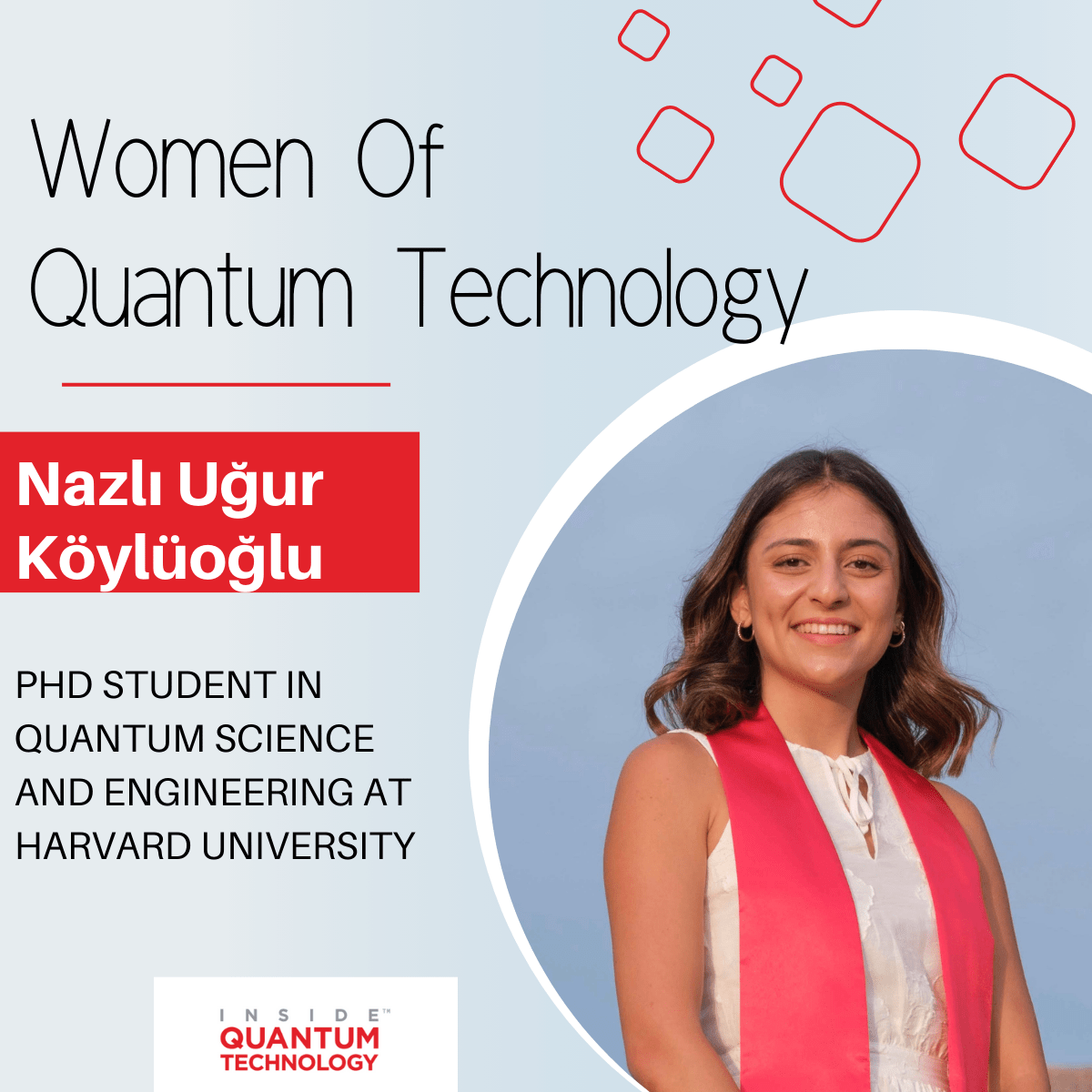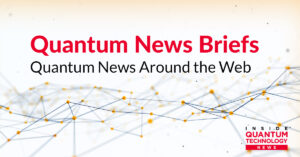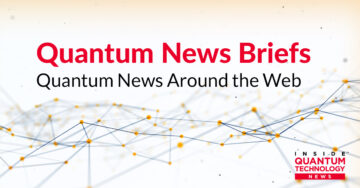
As the quantum industry gains momentum, the demand for skilled professionals who understand the intricacies of quantum technologies is on the rise. Students studying quantum computing position themselves at the forefront of technological innovation. One of these students is Nazlı Uğur Köylüoğlu, a graduate student in quantum science and engineering at Harvard University. Together with her peers, Köylüoğlu’s expertise will be crucial in developing quantum technologies, uncovering new applications, and advancing fundamental science.
For Köylüoğlu, the draw to quantum computing came from its combination of many fields. “Quantum technology combines quantum physics with computer science among other disciplines, fields that I was very interested in when I went to Stanford University [for my undergraduate degree],” explained Köylüoğlu. “This fascinating interdisciplinary dialogue enables the development of quantum simulators and computers, sensors, and furthers our understanding of physics and information science.” As one of the many individuals in the incoming talent wave for the quantum ecosystem, Köylüoğlu sees the field as having a pivotal moment. “We are at a special time when all of the fascinating ideas in quantum science and engineering are becoming reality, and theorists get to work closely with experiments,” she added. “Both in Schleier-Smith Lab at Stanford and now in Lukin Lab at Harvard University, I’ve had the chance to collaborate with experimentalists, which has been an incredibly rewarding experience.”
Before her current career at Harvard University, Köylüoğlu’s journey into quantum science began during her undergraduate career. “I began quantum research my freshman year in Prof. Benjamin Lev’s group at Stanford University, and then became a part of Prof. Monika Schleier-Smith’s group my freshman summer, which I stayed a member of throughout my undergraduate years, where I did theoretical research on quantum metrology and sensing,” she elaborated.
With her interest in quantum computing, she helped found the Stanford Quantum Computing Association, which connects undergraduates and graduate students with companies and organizations in the quantum ecosystem. Serving as President of the Association, Köylüoğlu quickly connected with some of the biggest names in the quantum industry. She added: “We have partnered with companies such as Google, IBM, Amazon, Microsoft, Rigetti, QCWare, IonQ, Atom Computing, and PsiQuantum to organize talks, workshops, panels, and field trips. We held lunches with quantum faculty, social events, and tournaments with other universities. To broaden our impact to a global scale, I have co-directed the first Quantum Coalition Hack (QCHack) hackathon organized in 2021 via a collaboration between Stanford and Yale students.” As a result of her and her team’s success, Köylüoğlu helped establish the Quantum Coalition Network, which many schools worldwide have joined.
If those efforts weren’t successful enough, during her undergraduate career, Köylüoğlu also interned at IBM Quantum, “where I had the chance to get a first-hand experience in quantum research in the industry,” she elaborated. “I was lucky enough to work with great mentors, Sona Najafi and Sarah Mostame, on quantum computing applications.”
Now a graduate student at Harvard University, Köylüoğlu is going deeper into studying quantum science. “I am a member of the first cohort of the Quantum Science & Engineering Ph.D. program at Harvard University,” she explained. “I am part of Prof. Mikhail Lukin’s research group, where I do theoretical research at the intersection of quantum many-body physics and quantum information.” As quantum information science is a key field for quantum computing, Köylüoğlu and the rest of her cohort are helping to make significant advancements to this next-generation technology.
With many successful leadership positions, Köylüoğlu understands that she can help make the growing quantum ecosystem more inclusive for women and other underrepresented groups. “Accessibility and representation are key,” she highlighted. “Quantum research requires a strong background in physics, math, and/or computer science, and engineering, which can be intimidating. Therefore, it’s important to focus on pedagogical efforts and lower the barrier of entry to quantum research.” University organizations like the Quantum Coalition Network or the Stanford Quantum Computing Association can help many students find a close-knit community and representation within quantum science, making it more inclusive.
But the efforts for making the ecosystem more inclusive should not only start at the university level. As Köylüoğlu added: “There are a wide variety of paths that lead to a career in the quantum academia or industry. I believe active outreach to increase awareness of the field and the set of talents to move it forward would be very helpful. Infiltrating these outreach efforts to early undergraduate and even high school years would immensely increase their effectiveness and diversify representation in the field.”
Kenna Hughes-Castleberry is a staff writer at Inside Quantum Technology and the Science Communicator at JILA (a partnership between the University of Colorado Boulder and NIST). Her writing beats include deep tech, quantum computing, and AI. Her work has been featured in Scientific American, New Scientist, Discover Magazine, Ars Technica, and more.
- SEO Powered Content & PR Distribution. Get Amplified Today.
- PlatoData.Network Vertical Generative Ai. Empower Yourself. Access Here.
- PlatoAiStream. Web3 Intelligence. Knowledge Amplified. Access Here.
- PlatoESG. Carbon, CleanTech, Energy, Environment, Solar, Waste Management. Access Here.
- PlatoHealth. Biotech and Clinical Trials Intelligence. Access Here.
- Source: https://www.insidequantumtechnology.com/news-archive/women-of-quantum-technology-nazli-ugur-koyluoglu-of-harvard-university/
- :has
- :is
- :not
- :where
- 2021
- 2023
- 7
- a
- Academia
- active
- added
- advancements
- advancing
- AI
- All
- also
- am
- American
- among
- an
- and
- applications
- ARE
- AS
- Association
- At
- atom
- awareness
- background
- barrier
- BE
- became
- becoming
- been
- began
- believe
- Benjamin
- between
- Biggest
- broaden
- by
- came
- CAN
- Career
- Chance
- closely
- coalition
- Cohort
- collaborate
- collaboration
- Colorado
- combination
- combines
- community
- Companies
- computer
- computer science
- computers
- computing
- connected
- connects
- country
- Creating
- crucial
- Current
- deep
- deeper
- Degree
- Demand
- developing
- Development
- dialogue
- DID
- disciplines
- discover
- diversify
- do
- draw
- during
- Early
- ecosystem
- effectiveness
- efforts
- elaborated
- enables
- Engineering
- enough
- entry
- establish
- Even
- events
- experience
- experiments
- expertise
- explained
- fascinating
- featured
- field
- Fields
- Find
- First
- Focus
- For
- forefront
- Forward
- found
- from
- fundamental
- Gains
- get
- Global
- global scale
- going
- graduate
- great
- Group
- Group’s
- Growing
- hack
- hackathon
- had
- harvard
- harvard university
- Have
- having
- Held
- help
- helped
- helpful
- helping
- her
- High
- Highlighted
- HTTPS
- i
- IBM
- ibm quantum
- ideas
- image
- immensely
- Impact
- important
- in
- include
- Inclusive
- Incoming
- Increase
- incredibly
- individuals
- industry
- information
- Innovation
- inside
- Inside Quantum Technology
- interest
- interested
- intersection
- intimidating
- into
- intricacies
- IONQ
- IT
- ITS
- joined
- journey
- Key
- lab
- lead
- Leadership
- Level
- like
- lower
- magazine
- make
- Making
- many
- math
- max-width
- member
- Metrology
- mikhail
- moment
- Momentum
- more
- move
- my
- names
- network
- New
- next-generation
- nist
- now
- Oct
- of
- on
- ONE
- only
- or
- organizations
- Organized
- Other
- our
- outreach
- panels
- part
- partnered
- Partnership
- peers
- Physics
- pivotal
- plato
- Plato Data Intelligence
- PlatoData
- position
- positions
- posted
- president
- professionals
- Program
- Quantum
- quantum computing
- quantum computing applications
- quantum information
- quantum physics
- quantum research
- quantum technology
- quickly
- Reality
- representation
- requires
- research
- REST
- result
- rewarding
- Rise
- Scale
- School
- Schools
- Science
- scientific
- Scientist
- sees
- sensors
- serving
- set
- Shares
- she
- should
- significant
- skilled
- Social
- some
- special
- Staff
- staff writer
- stanford
- Stanford university
- start
- stayed
- Story
- strong
- Student
- Students
- Studying
- success
- successful
- such
- summer
- Talent
- talents
- Talks
- tech
- technological
- Technologies
- Technology
- that
- The
- their
- themselves
- then
- theoretical
- therefore
- These
- this
- those
- throughout
- time
- to
- together
- Tournaments
- true
- underrepresented
- understand
- understanding
- understands
- Universities
- university
- variety
- very
- via
- was
- Wave
- we
- went
- when
- which
- WHO
- wide
- will
- with
- within
- Women
- Work
- Workshops
- worldwide
- would
- writer
- writing
- year
- years
- zephyrnet











